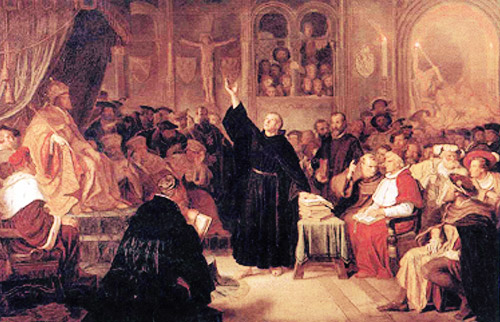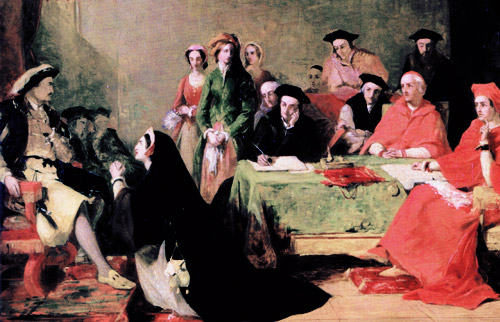One of the reasons I enjoy history so much is that it presents me with the whole image at once. Instead of being caught up in a single event, just as the people who lived through such times, I can see how all the threads connect, the aftermath of decisions made in those times, the good and negative outcomes. I often view the future with a hint of trepidation, because I cannot predict what it holds, so it comforts me to look back at history, and to create patterns that enable me to feel more certain about the future based on the past. History tends to repeat itself, so I learn from it. I strive to learn from everyone’s previous experiences, not merely my own, and to focus on the larger picture.
Some choose to focus on a very small part of Tudor history: that Henry’s divorcing of Katharine of Aragon introduced the Reformation into England, and established the Church of England. It opened the door for religious reform. On a superficial level, this seems good… but we must look to the larger picture, to the aftermath, to the thousands of people who died in England as first Reform and then Catholicism was forced upon them. Henry’s motives were impure and that tainted the aftermath. He did not have a religious awakening, nor did the spark of true faith burn in his soul; he saw Reform as an excuse to break from Rome and become an absolute moral authority in England. It appealed to his arrogant sense of pride, not his moral and religious beliefs. It was a means to an end, a way to get what he wanted (Anne Boleyn, and the desired male heir). Like so many others of the time, he embraced Reform not due to a salvation experience but for its political agenda.
Many Reformists were not Christians, because they did not take the recently translated teachings of Christ to heart. It is my belief that to be a Christian, you must adhere to Christ’s teachings, foremost of which is to love one another as we love ourselves, and to treat one another as we would like to be treated. To forgive, and forgive, and forgive again … into infinity, to hold no resentment against others but instead to extend to them grace. Though we are fallible and likely to fail in this without His continued assistance, it is what we ought to strive for as believers on a daily basis. This is the true test of a believer, and of any group that defines itself as “Christian” in its roots. Its motives and behaviors must fall under scrutiny, for we will know the followers of Christ by their fruit. Henry’s fruit was rotten, and much of the fruit that came out of the forced Reformation equally so.
When you have human beings persecuted, boiled in oil, burned alive, forced to flee the country for their lives, or executed because their religious beliefs do not align with those of the men in power, it is not an authentically Christian movement. Hatred for others is never the message of Christ, yet such prejudices remain today in modern believers. It is in our nature (which is inherently sinful) to develop an us vs. them mentality, which establishes us as superior either in intellect or morality, enabling us to look down upon them from our lofty heights. That is not “loving others as much as you love yourself.” That is moral superiority, a love of yourself above others. It is also the sin that Jesus came down hardest upon; He welcomed sinners of all stripes into His presence with loving correction, but he called the Pharisees out on their lack of compassion for others. And that is what we can see in the footprints of the Reformist movement: a total lack of compassion for other human beings.
We might sit back and wonder how Henry could do such things, how he could send his oldest adviser and friend, Sir Thomas More, to the chopping block for refusing to acknowledge Henry as the ultimate moral authority in England; but it is not difficult to understand when we return to the teachings of Christ. He reminded us many times that our thought life is as important as our actions. He realized that thoughts lead to actions; all sin begins with an idea nurtured, contemplated, and and manifested into reality. Love of self is indeed the root of all evil, for all evil actions toward others begin with a thought oriented toward self.
While the Reformation did reach some hearts and souls with the message of salvation, the movement itself quickly became political more than evangelical, and an issue of conflicting theological beliefs rather than transformed hearts. Had it not, we would have seen a genuine revival and a far different aftermath devoid of persecution, because the sacrificial messages of Christ are universal, easily understood, and once taken to heart, utterly transforming.




Awesome post, Charity. I never think on King Henry with any belief of his morality, or sincerity. And I totally agree that history is the strongest mirror for the present and future. It will always show us ourselves, and we, ourselves, are our future. Always something to think on.
Henry is, alas, a perfect example of a faith that never took root, but was instead a political extension of self — a lip service to a belief system that had absolutely no influence on any of his decisions. It’s tragic, but not uncommon for the period, either — which is even more sad.
It just goes to show that humans are sinful creatures. Even if the movement had started out as purely spiritually minded, it would have changed into something that didn’t have Christ at its heart and died out. Until Christ comes back, we will never have lasting revival.
Extremely true.
However strong the true faith of those participating in the movement, the movement will be changed.
I think you hit the nail right on the head with the reformation being more of a political movement than anything else. There is a vast difference between it and the revivals that swept through America. The revivals went after men’s hearts in an effort to induce change of the individual. The reformation was truly a means to an end for Henry. His one true faith was always in himself, how to get what he wanted most, and what means he could use to get it, no matter what they were. It’s tragic, but looking at the reformation through rose-colored glasses does us absolutely no good.
It’s the one downside to the Passages display of Bibles, following that history from start to finish. They try to paint the reformation in a positive light and I just couldn’t see it, no matter how hard I tried. Otherwise the display was incredible. 🙂
Yes!
True reform, as is true salvation, is obtained through God altering the hearts of those involved. Society shifts as a result of internalized change. Change aimed at reforming society from the outside in never works, because the heart must be changed before society can change. Movements to add morality back into modern society will fail, until modern society has enough believers in it that their behavior impacts society.
Henry tried to force Anglicanism upon England, in order to obtain his annulment and become the most powerful figurehead in England, untouchable by even the higher moral authority of the Church. True, the Church was corrupt at the time and full of sin (ambition, sexual practices, etc), but the way to reform it is not to strip it of its authority and give that authority to another immoral force. Lucifer laughed all the way to the bank with the Reformation. It was not a positive turning point. It merely spurred on persecution and hatred.
I’m sorry to hear that about Passages. It would be interesting to talk to the people who agreed what to display, and find out what their overview of the Reformation is…
This is a great post.
Thank you! 🙂